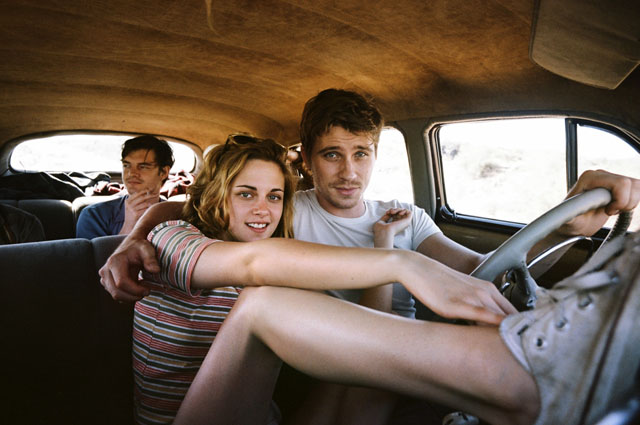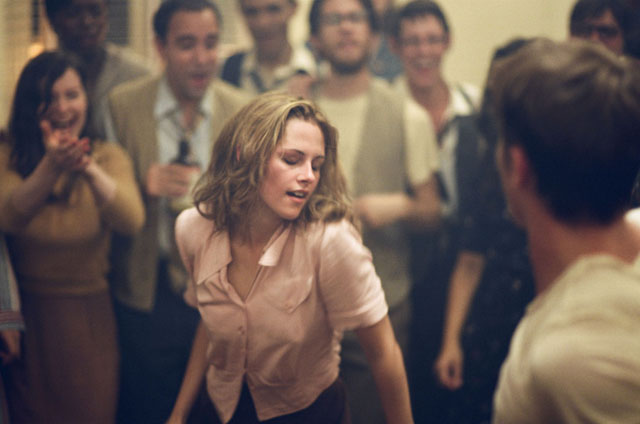Let’s begin with Manohla Dargis in the New York Times: “At one point in On the Road, Walter Salles’s respectable, muted take on Jack Kerouac’s ecstatic American story, Sal Paradise (Sam Riley), who’s trailed after his friends Carlo and Dean, watching them cavort in handsomely lighted gutter and atmospheric slum pads, delivers what should be a cri de coeur. ‘The only people that interest me,’ Sal says in voiceover, with Mr. Riley scatting out the famous words, ‘are the mad ones, the ones who are mad to live, mad to talk, desirous of everything at the same time, the ones that never yawn or say anything commonplace, but burn, burn, burn, burn like Roman candles across the night.’ Yet these boys scarcely simmer.” Little wonder, then, that the film was received in Cannes this morning “with well-behaved applause, a low-pulse response for a low-pulse endeavor.”
“If this handsome international coproduction does a solid job of conveying the feel of wide-open spaces of the ’40s (less so the scenes set in Ozone Park, Queens), it misses the book’s jazzier tone,” writes Time Out Chicago‘s Ben Kenigsberg. “Kerouac’s prose style—his enthusiasm, his openness, the way he gabs with everyone he meets—never registers in Sam Riley’s earnest performance as the author’s stand-in, Sal Paradise. This is On the Road as experienced by someone who exhibits no personality, a story of self-discovery in which there’s no self to discover. A boundary-pushing portrait of a generation ‘mad to be saved’ (an iconic passage the movie quotes only in part) has become an Oscar-baiting period piece in which rebellion is signified by Twilight‘s Kirsten Stewart going topless.”
“Garret Hedlund is Dean Moriarty, based on Neal Cassady, the freewheeling and irresponsible sensation-seeker who pulls Sal into his wake,” writes James Rocchi at the Playlist. “Riley has to carry the burden of being the viewpoint character, a position that always seems more passive on film than it does in print; people expecting the charismatic fireworks of his work in Control will be disappointed. But as Hedlund’s previous work—except for the wretched Tron: Legacy—has demonstrated, he’s a young actor with charisma and skill, making Dean both engaging and reprehensible…. And Viggo Mortensen and Amy Adams play the book’s stand-ins for William S. Burroughs and Jane Vollmer with drugged-up grit and gravel, a cautionary tale about to happen.”
This adaptation “has been a long time in the making,” notes Joan Dupont in the NYT. “Francis Ford Coppola ([producer] Roman’s father and the founder of American Zoetrope, now owned by Roman and his sister, the director Sofia Coppola) bought the film rights to the book in 1979; there were projects to make the movie with Jean-Luc Godard and the writer Barry Gifford. Mr. Coppola finally teamed up with Mr. Salles, who also carried the project in his heart for many years. ‘I first read the book in Brazil in the mid 1970s,’ Mr. Salles said. ‘I was 18 and we were living under the worst years of military dictatorship. Our culture was affected by what we were allowed to read and see. Even the roads were blocked for military control. We had no open road. The book was the reverse angle of everything we were living.'” The Los Angeles Times‘ Kenneth Turan interviews Salles as well.
The Guardian‘s Peter Bradshaw finds On the Road to be “comparable to Salles’s 2004 film The Motorcycle Diaries about the early adventures of Che Guevara and his buddy Alberto Granado—but there the travellers were learning to think and care about people other than themselves.” The film “does, ultimately, have a touching kind of sadness in showing how poor Dean is becoming just raw material for fiction, destined to be left behind as Sal becomes a New York big-shot. But this real sadness can’t pierce or dissipate this movie’s tiresome glow of self-congratulation.”
Salles and screenwriter Jose Rivera “seek to render Kerouac’s recollections of postwar America in a vibrant, present-tense idiom,” writes Variety‘s Justin Chang. “To that end, the film employs a jittery syntax—fleet handheld camerawork, frequent jump cuts and a swinging jazz score that erupts at regular intervals—to supply a superficial equivalent of the author’s restless prose, supplemented with abundant helpings of sweaty sex and occasional nudity.”
“With a romantic like Salles at the wheel we weren’t expecting On the Road to hold a mirror to today’s disenfranchised American youth,” writes David Jenkins in Little White Lies. “But we weren’t expecting such a tedious, flat film either.” Time Out London‘s Dave Calhoun agrees that the film “entombs its era’s zeitgeist more than it lives it.”
“While the film’s dramatic impact is variable, visually and aurally it is a constant pleasure,” offers Todd McCarthy in the Hollywood Reporter. “Eric Gautier’s cinematography is endlessly resourceful, making great use of superb and diverse locations (including New York, Canada, New Mexico, California, Louisiana, Mexico and Argentina). The cars, beginning with the central Hudson, are terrific, as are the décor, clothes and wide range of music. The film was researched to the limit, and it shows.” Screen‘s Lee Marshall adds that “the soundtrack, scored by Gustavo Santaolalla with jazz musicians Charlie Haden and Brian Blade, is a concise snapshot of the era.”
More from Owen Gleiberman (Entertainment Weekly), Eric Kohn (indieWIRE), Drew McWeeny (HitFix), Eric D. Snider (Movies.com) and Anne Thompson.
Updates, 5/26: All in all, finds Mike D’Angelo, writing at the AV Club, “this is pretty painless as prestige-lit adaptations go, moving along at a brisk clip and providing numerous opportunities for talented actors to perform what amount to cameo impersonations…. All that’s missing is any sense that you’re seeing something more than a procession of anecdotes meant to provide a colorless protagonist (Sam Riley) with material for his book. In other words, all that’s missing is Kerouac’s voice—the reason the book is worth reading.”
“Kerouac’s greatest gift was to transmute the thrill and danger of the vagrant life into prose every bit as intoxicating as the original experience,” writes Time‘s Richard Corliss. “In an early story, he expanded his joy at hearing a tenor sax player blow ‘Gator Tail’ into a declaration of the pleasure principle: ‘I like my whiskey wild, I like Saturday night in the shack to be crazy, I like the tenor to be woman-mad, I like things to GO and rock and be flipped, I want to be stoned if I’m going to be stoned at all, I want to be gassed by a back-alley music…’ Wouldn’t you want to see a movie whose images and emotions matched that rush of words? See this film and keep wanting and waiting.”
“Everything looks great,” notes Time Out New York‘s David Fear: “the endless shots of America at dusk, the scenes of Kristen Stewart’s sweet little Marylou and other hopped-up jazzbos dancing to Dizzy, the weathered faces that could have been lifted from a Robert Frank portfolio, the sensual threesomes in chipped-paint apartments. But even at its most hyperventilating, this finely detailed period piece comes off like a stuffy prestige pic—the cinematic equivalent of a fancy, leather-bound Library of America edition.”
“Unfailingly earnest and unassailably ambitious, Walter Salles’s On the Road is more of an embalming than an adaptation,” writes Richard Porton for the Daily Beast.
“Among the great might-have-beens of cinema are Greta Garbo as Dorian Gray, Ingmar Bergman directing Barbra Streisand in The Merry Widow, Orson Welles’s The Heart of Darkness, Sergei Eisenstein’s An American Tragedy, and the young Marlon Brando as Dean Moriarty in On the Road,” writes Ronald Bergan for Bright Lights. “Before his death, Dennis Hopper revealed that at the start of the 1980s, he discussed the project with Jean-Luc Godard, who came to California. When Hopper arrived at Coppola’s San Francisco office to meet Godard, he found a note that read, ‘I can’t breathe the air here. I’ve returned to France. I’ve decided that there are no new routes in America.’ Decades earlier, when the novel was first published, Kerouac approached Brando to buy the rights and appear in the film as Dean Moriarty. But Brando turned it down because he felt the structure of the novel was unadaptable to the screen. On the evidence of Walter Salles’s film…, Brando was right on the money.”
Steve Chagollan tells the story of this adaptation in the NYT. More on the film from Simon Abrams (Press Play), Kaleem Aftab (Independent), Glenn Heath Jr. (L) and Domenico La Porta (Cineuropa).
Update, 5/29: At the Playlist, Aaron Hillis follows up one interview with Salles with another with Stewart and Hedlund.
Cannes 2012 Index: a guide to the coverage of the coverage. For news and tips throughout the day every day, follow @KeyframeDaily on Twitter and/or the RSS feed. Get Keyframe Daily in your inbox by signing in at fandor.com/daily.





